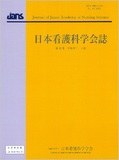Japanese
English
- 販売していません
- Abstract 文献概要
- 参考文献 Reference
要旨
目的:統合失調症患者が幻聴を体験している時に,家族からどのような反応を得るか,その反応によって患者が幻聴に対してどのように自己分析し対処しているのかを明らかにすること.
方法:家族と同居している幻聴の経験がある統合失調症患者10名に半構成的インタビューを実施し,修正版グラウンデッドセオリーアプローチを用い分析した.
結果:〈家族に理解されない悲嘆への自己防衛〉にもがきながらも,自分にとって一番身近な家族に助けを求め〈幻聴への対応を家族と協働〉する.その過程で家族の愛情に支えられながら〈幻聴との共存〉から《幻聴から逃げない自分》を獲得していた.
結論:家族の影響を受けながら《幻聴から逃げない自分》を獲得するプロセスは,家族にぬくもりの希求をし,家族から心配される実感を得,家族の愛情に支えられながら,幻聴が聞こえる現実から逃避せず,心を改革し自分らしい生活への可能性を見出していくための挑戦である.
Purpose: This study aimed to determine the reactions received by patients with schizophrenia from their families when experiencing auditory hallucinations, as well as the self-analysis and coping of patients with their auditory hallucinations following these reactions.
Methods: Semi-constructive interviews were conducted with 10 patients with schizophrenia experiencing auditory hallucinations who live with their families and were analyzed using a modified grounded theory approach.
Results: Patients sought help from their closest family members and collaborated with them in dealing with auditory hallucinations while struggling with "self-protection against grieving not understood by family members." Furthermore, the patient was able to "coexist with auditory hallucinations" and thus "become a person who does not run away from auditory hallucinations," with the support of the family's love in the process.
Conclusion: The process of acquiring a "self that does not run away from auditory hallucinations" under the influence of family members is a challenge for patients to seek warmth from their family, feel their concern, be supported by their love, not escape from the reality of auditory hallucinations, and constantly reform their mind and find the possibility of a life that is theirs.
Copyright © 2023, Japan Academy of Nursing Science. All rights reserved.


